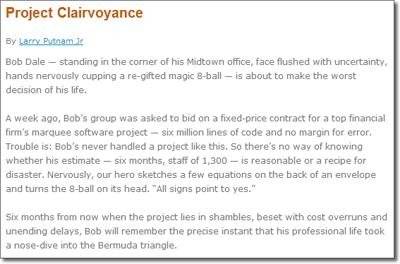New Article: Project Clairvoyance

Can advances in data-driven estimation turn software project failure into a distant memory? Well, if learning from experience is the key to success, imagine what you could do with real-time access to three decades of research, thousands of projects and more than 600 industry trends. In this article, originally published on Projects at Work, QSM's Larry Putnam, Jr. identifies key benefits of employing estimation best practices for project success.
As Co-CEO for QSM, Larry Putnam, Jr.'s has more than 25 years of experience in software measurement, estimating and project control. He joined QSM in 1987 and has worked in every aspect of the business, including business development, customer support, professional services and now executive management.
